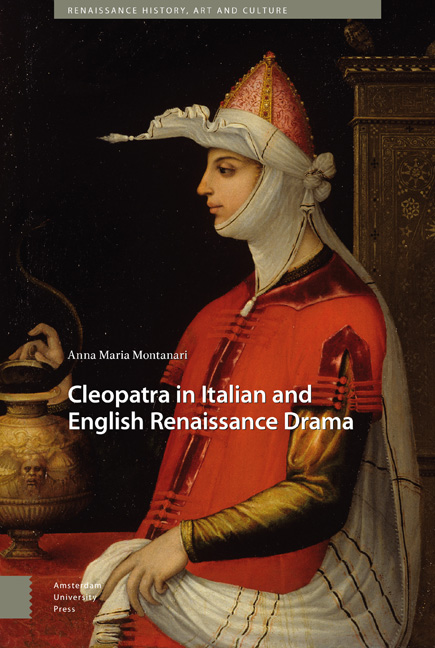Book contents
- Frontmatter
- Dedication
- Epigraph
- Contents
- List of Illustrations
- A Note on the Cover
- List of Abbreviations
- Acknowledgements
- Introduction
- 1 ‘No Humble Woman She’
- 2 ‘The Subject of Talk the World Over’
- 3 The Egyptian Queen's Rebirth
- 4 The Great Theatre of Cleopatra
- 5 ‘The Wanton Luxurie of Court’
- 6 ‘A Lass Unparalleled’
- Conclusion
- Bibliography
- Index
4 - The Great Theatre of Cleopatra
Published online by Cambridge University Press: 21 November 2020
- Frontmatter
- Dedication
- Epigraph
- Contents
- List of Illustrations
- A Note on the Cover
- List of Abbreviations
- Acknowledgements
- Introduction
- 1 ‘No Humble Woman She’
- 2 ‘The Subject of Talk the World Over’
- 3 The Egyptian Queen's Rebirth
- 4 The Great Theatre of Cleopatra
- 5 ‘The Wanton Luxurie of Court’
- 6 ‘A Lass Unparalleled’
- Conclusion
- Bibliography
- Index
Summary
Abstract
Other Italian dramatists who chose Cleopatra as their subject matter. A close analysis of Cesare De Cesari's Cleopatra (1552), whose protagonist is, above all, a political leader. The third Italian Cleopatra play: Marc’Antonio e Cleopatra (1576) by Don Celso Pistorelli. Its structure and style. Pistorelli’s treatment of the story is as varied as possible within the limitations of the neoclassical tragedy. The most peculiar of the Italian Cleopatra plays: the anonymous Cleopatra e Marc’Antonio (Codice Aldini 392, Biblioteca Universitaria of Pavia, Italy).
Keywords: Italian Renaissance drama; Cesare de’ Cesari; Celso Pistorelli; the anonymous Cleopatra e Marc’Antonio
An ‘invincible heart’
Giraldi Cinthio was the first of a series of Italian dramatists who chose Cleopatra as their heroine. Cesare De Cesari – the author of the second Italian Cleopatra play, in chronological terms, published in 1552 – was born in Naples. We don't know much about him, beyond the fact that he enjoyed great success among his contemporaries and that, besides the Cleopatra, he wrote two other tragedies which have come down to us, the Romilda and the Scilla, both published between 1551 and 1552. In his prefatory letter to the Romilda, De Cesari cites yet another tragedy, the Argia, which has been lost. He was part of the Accademia dello Sdegno or degli Sdegnati (Academy of the Disdainful), founded by the well-known poligrafo Girolamo Rucelli and by Tommaso Spica in Pope Paul III's Rome, and they apparently held him in high regard.
De Cesari's tragedy is even more nondramatic than Giraldi’s. When the play opens Antony is already dead and in the first three acts there is a total absence of significant incidents. In Act IV, Antony's funeral takes place, while in the last act, the only well-known event (Cleopatra's death) is narrated second hand by the chorus. The core of the tragedy lies in the political and philosophical chess game between two leaders – the queen and Octavian – both conscious of their respective greatness. The prize at stake is a dignified death for Cleopatra – who could thus put an end to her pains and avoid the shame of Caesar's triumph – and glory for Caesar, who needs the queen as his ‘desiata preda’ (I.360).
- Type
- Chapter
- Information
- Cleopatra in Italian and English Renaissance Drama , pp. 105 - 174Publisher: Amsterdam University PressPrint publication year: 2019



